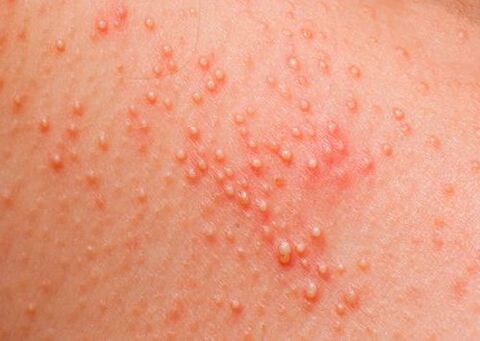Parasites are disease-causing organisms that can parasitize humans, animals, and even some plants. There are many kinds of organisms in the world that will invade the host's body, feed on its useful substances, actively multiply and leave waste in its body, leading to the occurrence of various diseases.
In most cases, worms exist in humans. These are worms of various lengths and sizes, mainly living in the intestines of vertebrates. But some worms can move throughout the body, invading muscles, liver, heart, joints, lungs, and even the brain.
Worms can harm the host's body, so everyone should know how to determine whether there are parasites in the body. But many people do not want to go to the hospital, waste time, and receive unreasonable worm testing.
In this case, people can determine whether there are parasites in the body by paying attention to important criteria such as the characteristic symptoms of a certain helminthiasis. What if they are not there? This will not happen!
However, in the early stage of worm invasion, the signs of life activities of foreign microorganisms are rarely expressed or completely absent. Only when the worms are actively developing, the clinical manifestations become intense and obvious, because their larvae cannot parasitize humans.
How to determine the presence of worms in the body without medical research?

Different types of parasites cause characteristic symptoms in the host. If they are identified in time and deciphered correctly, then the infection can be determined even at an early stage.
Therefore, the possibility of false diagnosis is minimized, which will allow the use of folk or medical antiparasitic agents to dewormers correctly and effectively.
Therefore, in order to identify the parasites in the human body, you need to pay attention to the following symptoms:
- Grind your teeth at night.
- Allergic rash-acne, acne, urticaria, cold sores, eczema, erythema, papilloma, neurodermatitis, psoriasis, etc.
- The development of upper respiratory tract diseases (bronchitis, pneumonia, runny nose), which is characteristic of ascariasis and strongyloidiasis.
- Since long worms interfere with the excretion of bile and pancreatic juice, abdominal distension and diarrhea occur.
- Constipation occurs when the worm forms a ball that blocks the passage of the intestinal tract.
- The migration of parasites causes discomfort in joints and muscles.
- Severe irritability caused by painful symptoms.
- A persistent dry cough that cannot be treated with standard antitussives.

The body temperature was also observed to rise to sub-calorific values. The cause of this condition may be allergies, blood poisoning, neurological diseases, visceral and brain dysfunction, and anemia syndrome.
In addition, the worms in the human body greatly reduce his immunity, so patients often catch colds. In addition, patients may experience long-term depression due to body poisoning.
The characteristic symptoms of helminthiasis are nausea and vomiting, which are also caused by the release of toxic substances. In addition, certain types of worms can live in the human body and produce specific hormones that affect the intestinal flora, leading to diarrhea.
However, in some cases, these symptoms are not attributed to helminthiasis because they resemble signs of food poisoning. Although this may become a serious problem, because the later the treatment is started, the greater the damage the parasites will do to the host's organs and systems.
Therefore, in order to detect helminthiasis at home, a test should be performed. To this end, it is necessary to answer the following questions:
- Does the anus itch at night?
- Are the lymph nodes swollen?
- Is there a rash?
- How often does insomnia occur?
- Do you have vomiting and nausea?
- Is there joint and muscle pain?
- How often does flatulence occur?
- How often does the bitter taste appear in the mouth?
If a person gives seven affirmative answers to these questions, then it is likely that his body is infected with a worm.
How to identify the type of worm disease by symptoms?

At home, you can determine which worms are parasitic in the human body. But this can only be done when the parasite has reached the active stage of its development.
Ascariasis and bilobal filariasis are characterized by the most severe neurological symptoms in young patients. The increase in aggressive behavior and tension is due to the effects of toxic substances on the nervous system. For similar reasons, people who are infected experience migraines and dizziness.
Usually, trichinosis is accompanied by joint and muscle pain, as well as swelling of the face and eyelids. This is due to the particularity of Trichinella living in skeletal muscle. If you eat wild animal meat or pork that has not been sufficiently heat-treated, you may be infected with this parasite.
Giardiasis can affect the function of the liver and kidneys and cause various allergic reactions. In addition, some people suffer from arthritis due to poisoning when their body is damaged by lanseria. In addition, in invasive patients, the immunity is weakened. In this context, the following diseases will appear:
- Sinusitis;
- Stomatitis;
- Bacterial vaginosis and so on.

A feature of pinworm disease is itching in the anal canal. In addition, the work of the gastrointestinal tract of most infected people is disturbed.
Anemia syndrome is a characteristic of schistosomiasis. There are also signs of ecological disorders (pathogenic microorganisms inhibit favorable microbial communities).
For mycoplasmosis, lamellar disease, and posterior testicular disease, the gallbladder is affected and jaundice syndrome occurs. In addition, against the background of the course of these helminths, the liver and spleen increase.
Strongyloidiasis shows a variety of symptoms. Therefore, as it progresses, the gastrointestinal tract appears dysfunction, indigestion, and allergies.
How to judge whether there are worm eggs without laboratory conditions? When worms are in the breeding period, it is easy to find their presence in the body. To do this, you need to analyze the parasite eggs.
With the development of posterior testicular disease, you can conduct your own research at home. To do this, tape or tape must be applied to the skin in the anal area.
It is best to do this procedure as soon as you wake up in the morning. If a person has anterior testicles, then their eggs will be recognized on the sticky surface of the tape.
Laboratory methods for detecting parasites

If the patient has more than three characteristic symptoms of helminthiasis, they should contact a medical institution to confirm the presence of parasites at home through the laboratory.
The first step in suspicion of worm invasion is to study feces. This allows you to identify the eggs of tapeworms, round worms and flukes. However, in order to accurately confirm the diagnosis, inspections must be performed 3 times every few days.
To determine pinworm disease, scrape near the anus. In addition, one of the most accurate and convenient tests for patients is ELISA, which allows you to detect antibodies in the blood produced by the human body when pathogenic microorganisms are parasitic.
Sometimes a bioresonance diagnosis is performed to study the frequency of parasites. This method is very useful because it can determine the state of the entire body. In addition, in addition to parasites, such research can also allow you to find out the state that weakens its immunity to identify other diseases, as well as pathogenic fungi, bacteria, and viruses.

























